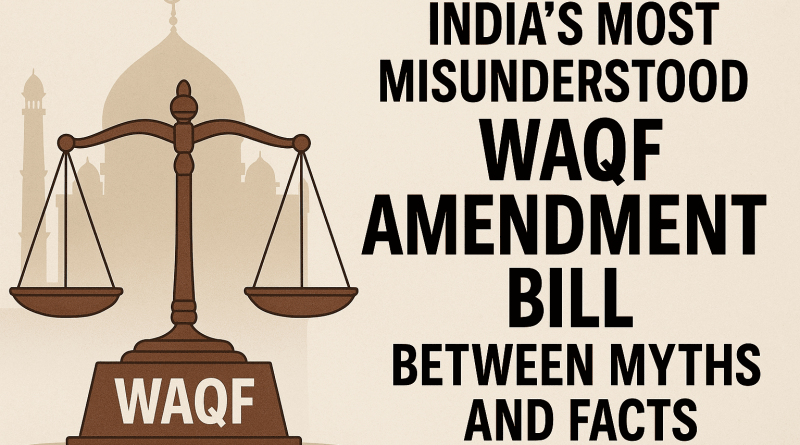India’s Most Misunderstood Waqf Amendment Bill Explained
Whether the bill is truly an infringement on religious freedoms or a necessary step toward greater transparency and accountability in Waqf administration
India’s Waqf Amendment Bill, 2024, has ignited widespread debate and strong reactions, particularly within the Muslim community. Many critics argue that the proposed changes pose a serious threat to the sanctity of religious endowments, raising concerns about potential government overreach and the erosion of long-held community rights.
The controversy has fueled protests, social media discussions, and legal debates, with different factions interpreting the bill’s provisions in varying ways.
Amid the uproar, a detailed analysis by senior journalist Harsh Ranjan, published in The Statesman newspaper, sheds light on the actual intent and implications of the amendment. His article aims to cut through misinformation and present a fact-based breakdown of the bill, explaining how it seeks to address longstanding issues of mismanagement, corruption, and land encroachments within Waqf properties.
By offering a balanced perspective, the analysis clarifies whether the bill is truly an infringement on religious freedoms or a necessary step toward greater transparency and accountability in Waqf administration.
The Purpose of Waqf and the Need for Reform
Waqf properties are meant to serve the welfare of the Muslim community, supporting initiatives such as education, healthcare, and religious activities. However, over the years, numerous instances of land grabbing, fraudulent claims, and misuse by politically connected individuals have come to light.
Instead of benefiting underprivileged Muslims—particularly women—Waqf properties have often been exploited for personal gains.
Despite multiple amendments in the past, previous laws failed to address these concerns effectively. The Waqf Amendment Bill, 2024, is a legislative attempt to correct these issues by ensuring that Waqf properties are protected and utilized as originally intended.
Key Features of the Waqf Amendment Bill, 2024
The Bill introduces several crucial measures aimed at transparency, accountability, and legal ownership verification. Below are the major aspects of the amendment:
1. Protection of Waqf Properties Through Digital Record-Keeping
One of the primary concerns with Waqf property management has been the lack of proper identification and record-keeping.
The amendment mandates:
- Digitization of all Waqf properties.
- Prevention of encroachments through better documentation and transparency.
- Swift resolution of disputes related to Waqf properties.
By introducing a digital registry, the bill aims to curb unauthorized claims and fraudulent transactions, ensuring that endowments remain dedicated to their intended charitable and religious purposes.
2. Restriction on Fraudulent Waqf Declarations
A key change is the restoration of the pre-2013 definition of Waqf property dedication. The 2013 amendment allowed any person to dedicate property as Waqf, which led to numerous fraudulent claims. The new amendment:
- Limits Waqf dedication to legal owners of the property who are of the Islamic faith.
- Requires the person dedicating a property to have been practicing Islam for at least five years.
- Mandates verification of ownership before Waqf status is granted.
This measure ensures that only genuine religious endowments are recognized and prevents fraudulent conversions of property into Waqf status.
3. Removal of the “Waqf by User” Clause
Previously, properties could be classified as Waqf based on long-term usage rather than legal documentation. This led to disputes where even government-owned properties were wrongly classified as Waqf.
The amendment:
- Requires formal Waqf deeds for any new Waqf declaration.
- Protects existing registered Waqf properties unless they are in dispute or government-owned.
- Prevents unauthorized claims over public and private properties.
4. Clarification of Muslim Charitable Trusts’ Status
To prevent the wrongful takeover of independent Muslim charitable trusts by Waqf Boards, the bill clarifies that trusts established under separate statutory provisions will not be treated as Waqf properties. This prevents undue interference and ensures that Muslim charitable organizations operate freely.
5. Mandatory Registration of Waqf Properties on the WAMSI Portal
A major administrative issue has been the failure to upload Waqf records on the Waqf Assets Management System of India (WAMSI) portal. The bill makes it compulsory for all Waqf properties to be registered online within six months, ensuring greater transparency and accessibility.
6. Prevention of Wrongful Declaration of Government Properties as Waqf
Several cases, such as the disputed 123 Waqf properties in Delhi and conflicts involving the Surat Municipal Corporation, highlighted the issue of government properties being wrongly classified as Waqf. The amendment:
- Introduces Section 3C, requiring verification by a designated state-appointed officer before government property can be declared as Waqf.
- Ensures that public assets are protected from wrongful appropriation.
7. Transfer of Waqf Surveys to the Collector’s Jurisdiction
To improve efficiency, the amendment shifts the responsibility of pending Waqf property surveys from Waqf Boards to the jurisdiction of the Collector, who will follow state revenue laws for surveys and verification.
8. Strengthening Governance and Accountability of Waqf Boards
State Waqf Boards have long been criticized for corruption, mismanagement, and lack of accountability.
The amendment includes:
- Mandatory monthly meetings for Waqf Boards to ensure regular oversight.
- Requirement for all new Waqf registrations to be verified by the Collector before approval.
- Omission of Section 40, which previously allowed Waqf Boards to declare any property as Waqf without scrutiny.
9. Stricter Disqualification Criteria for Mutawallis (Custodians of Waqf Properties)
To prevent misuse of Waqf assets, individuals involved in malpractices will be disqualified from serving as Mutawallis. This measure ensures that only responsible custodians oversee Waqf properties.
10. Strengthening Legal Mechanisms for Waqf Disputes
The amendment introduces a structured legal framework:
- Appellate Mechanism: Section 83(9) allows for tribunal decisions to be challenged, strengthening judicial remedies.
- Applicability of the Limitation Act: This prevents indefinite litigation, ensuring timely resolution of disputes.
- Removal of Section 108A: This section previously granted Waqf laws overriding authority over other legal provisions. The amendment removes this, ensuring consistency in legal applications.
A Step Towards Transparency and Reform
India’s Waqf Amendment Bill, 2024, brings much-needed reforms aimed at curbing corruption, preventing unauthorized claims, and ensuring better management of Waqf properties. By emphasizing transparency, legal ownership verification, and administrative accountability, the bill seeks to restore the credibility of Waqf Boards while protecting the interests of both the Muslim community and the larger public.
While concerns exist about the bill’s impact, its focus on proper governance and fair property management signals a move towards a more just and transparent system. However, it remains to be seen how effectively the new provisions will be implemented to safeguard Waqf assets for their intended purposes.



